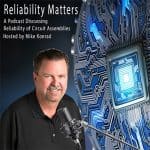
A Hard Drive Issue Ate My Homework
Abstract
Adam and Fred discussing how to pursue reliability in home/office computing.
ᐅ Play Episode
Your Reliability Engineering Professional Development Site
by Adam Bahret Leave a Comment

Adam and Fred discussing how to pursue reliability in home/office computing.
ᐅ Play Episode

Kirk and Fred discussing underwater drones and how we divide up a product to most efficiently apply HALT to subsystems before applying stress to the whole product
ᐅ Play Episode
by James Kovacevic Leave a Comment

Asset management means to get the best value from your assets in a collaborative way. It helps you manage your assets safely and in a cost-effective manner. The organizations need to understand the risks involved in introducing unsafe practices into the field. These unhealthy practices can put the lives of your engineers at risk and cost you heavily in terms of asset damage and equipment repairs. Asset management is a journey and even though your organization might already be doing asset management, there’s always room to improve.
In this episode, we covered:
by George Williams Leave a Comment

Join us as we interview Rising Star, LaWayne Smith, Head of Asset Management and Reliability at KU Medical Center as we talk about his journey and his goals for a future state. Follow his growth with us and be on the look out for great things from this gentleman in the future!
[Read more…]
by Robert Kalwarowsky Leave a Comment

On this week’s episode, I welcome Rob Gabrielcyzk to the show. Rob is the managing director of AEON Engineering and an expert in systems engineering. We discuss some principles of systems engineering and look at some of the parallels between systems engineering and reliability.
I have released my own reliability, maintenance and asset management coaching, consulting and professional services offerings, check out robsreliability.com for more information and if I can help you become a better reliability engineer or your company achieve it’s reliability goals, please email me at robsreliabilityproject@gmail.com. I look forward to working with you.
In addition, if your company sells products or services to maintenance, reliability and asset management professionals and you would be interested in having your message spread to engaged industry professionals, tell your marketing manager about Rob’s Reliability Project. There are advertising options available from appearing on the podcast, video/picture content to having an ad read on the show. If one of those appeals to your company, email me at robsreliabilityproject@gmail.com to get more information.
If you haven’t signed up for my weekly reliability newsletter with extra exclusive content, go to http://robsreliability.com/email-list/ and sign up!
Follow Rob Gabrielczyk on LinkedIn – https://www.linkedin.com/in/robgabrielczyk/
Check out Rob’s Reliability – www.robsreliability.com
Follow Rob’s Reliability Project on LinkedIn – https://www.linkedin.com/company/robsreliabilityproject/
Follow Rob’s Reliability Project on Facebook – https://www.facebook.com/robsreliabilityproject/

Kirk and Fred discussing discussing the recent article that Kirk posted on LinkedIn about smartphone’s water resistance
ᐅ Play Episode
by Tim Rodgers Leave a Comment

Tim Rodgers interviews Eric concerning his online newsletter, Warranty Week, concerning his ongoing reporting on the warranty industry.
by Christopher Jackson Leave a Comment

Chris and Fred discuss ‘Leaders that Don’t Understand.’ And by ‘Don’t Understand’ … we mean they don’t understand what their organization sells or does. Sometimes this can work (within reason). Leaders who are not experts in their product or services can still be effective if they know that they need to listen to those around them. But this can go too far – if all decisions need to be collectively agreed by a large cadre of people before the leader in question agrees to make a decision. This isn’t leadership at all. The concept of having ‘everyone on board’ can decimate decision making speed, innovation and a focus on customers. Have you had a similar experience?
ᐅ Play Episode
by Mike Konrad Leave a Comment

What happens when an electronic contract manufacturer follows their customer’s instructions to the detriment of the product? Product failures, blame, drama, and a really big lawsuit.
Mike Konrad reviews the trials and tribulations of a contract manufacturer and their customer. Assembly residue-related failures (ECM) contributed to product failures, product recalls, and, ultimately, a multi-million-dollar lawsuit.
Misguided “best practice” techniques only made matters worse. This podcast will discuss what factors contributed to the “perfect storm” of product failures. Factors that go as far back to original product designs, printed circuit board fabrication, storage and handling, assembly, testing, and coating. While mistakes were made all along the way, product failures could have been avoided with a few simple process changes, adding mere pennies to the cost of each assembly while saving hundreds of thousands of dollars in litigation.
by James Kovacevic Leave a Comment

Maintenance metrics is a very important part of a maintenance and reliability program because you can’t improve what you can’t measure. Performance measurement is necessary to derive those improvements that will help you carry out your maintenance activities the best way possible. It is a cycle that can be divided into three steps. First you have to enable you team members, then you have to train them, and in the end you have to measure their performance on a consistent basis using some standard KIPs. It is repetitive process and you have to perform these three steps often to make sure everything is going according to the plan.
In this episode, we covered:
by George Williams Leave a Comment

Join us as we interview Rob Kalwarowsky, host and creator of Rob’s Reliability Project as we discuss his learnings, his offerings, and what the futrue holds.
[Read more…]
by Robert Kalwarowsky Leave a Comment

This week on Rob’s Reliability Project, I welcome on Peter Horsburgh to talk about his book, 5 Habits of Extraordinary Reliability Engineers. We talk about what the 5 habits are, how to apply them and Peter gives us his top tips on how to become an extraordinary reliability engineer!
I have released my own reliability, maintenance and asset management coaching, consulting and professional services offerings, check out http://robsreliability.com/ for more information and if I can help you become a better reliability engineer or your company achieve it’s reliability goals, please email me at robsreliabilityproject@gmail.com. I look forward to working with you.
In addition, if your company sells products or services to maintenance, reliability and asset management professionals and you would be interested in having your message spread to engaged industry professionals, tell your marketing manager about Rob’s Reliability Project. There are advertising options available from appearing on the podcast, video/picture content to having an ad read on the show. If one of those appeals to your company, email me at robsreliabilityproject@gmail.com to get more information.
If you haven’t signed up for my weekly reliability newsletter with extra exclusive content, go to http://robsreliability.com/email-list/ and sign up!
If you have any questions, business inquiries or if you’d like to appear on the podcast, email me at robsreliabilityproject@gmail.com
Check out http://robsreliability.com/
For the 5 Habits of Extraordinary Reliability Engineers – https://www.reliabilityextranet.com/the-5-habits/
Follow Peter Horsburgh on LinkedIn – https://www.linkedin.com/in/phorsburgh/
Follow Rob’s Reliability Project on LinkedIn – https://www.linkedin.com/company/robsreliabilityproject/
Follow Rob’s Reliability Project on Facebook – https://www.facebook.com/robsreliabilityproject/

Kirk and Fred discussing old gasoline motors used in lawn equipment and how they can last what seems forever.
ᐅ Play Episode

Kirk and Fred discussing the recent failures of the new folding Samsung Galaxy phone and what might have been missed in their testing video.
ᐅ Play Episode
by James Kovacevic Leave a Comment

Most of the organizations in the maintenance and reliability industry have limited resources and they want to make the best use of what they have got. If the maintenance requirements of an organizations don’t match its resources, it is always going to result into an increased cost and decreased employee performance. The type of maintenance that an asset required throughout its life cycle needs to be performed in a balanced way. That’s why it is so important to have a maintenance philosophy when you are planning the life cycle cost of an asset. Level of Repair Analysis or LORA is a framework that helps you manage between maintenance cost and resources.
In this episode, we covered:
 Ask a question or send along a comment.
Please login to view and use the contact form.
Ask a question or send along a comment.
Please login to view and use the contact form.